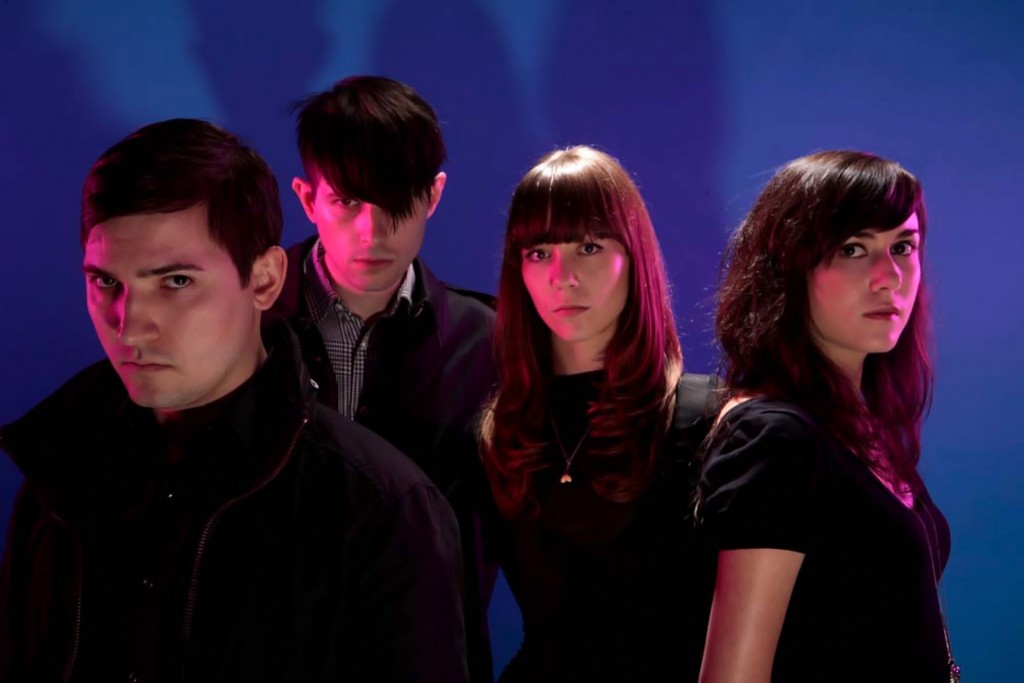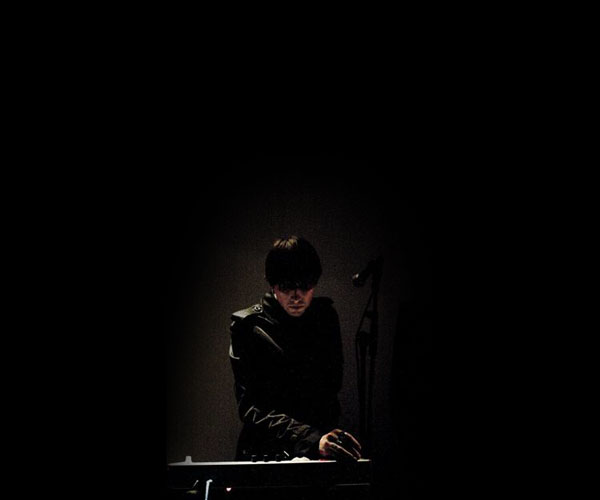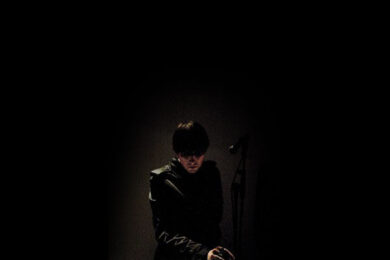_More pictures by Stu Green at Shot2Bits.net
“Everything changing will unchange again/Sun sheds the light as the life sheds the skin” – Cold Cave, ‘Love Comes Close’
Reviving the synthetic end of the 1980s has become so familiar as to be passé in 2009, but Love Comes Close, the debut album proper from Philadelphia’s Cold Cave, is the sort of intense, lovelorn take on the era that makes you feel slightly guilty about even deigning to slot it into a scene. Nine tracks of melodic, electronic pop and darkwave — yeah, that gothic dancefloor staple darkwave — its principle charm is in recalling that even the most broadly upbeat of the early-80s wave still sounded like its optimism was hard-won: love songs cast out of clanking machinery, choruses clear and bright so as to cut like spotlights through the gloomy, post-industrial fog.
It helps, of course, that Cold Cave are essentially an industrial band too; their recent compliation Cremations, released earlier this year on Dominick ‘Prurient’ Fernow’s New York-based noise label Hospital Productions, showcased a much more abrasive side of the band, with the likes of ‘Sex Ads’ — a song about answering online personals and going on dates with the living dead — built from foghorn synthesiser drones and pulsing beats that push and push vainly against crackling sheets of distortion.
It turns out that Wes Eisold, Cold Cave’s leader (and for a while sole member) is a man with some history. Formerly leader of arty hardcore outfits American Nightmare, Give Up The Ghost and Some Girls, Eisold has been a hero to many in the punk underground — notably, Pete Wentz of Fall Out Boy, who apparently lifted some of Eisold’s lyrics for Fall Out Boy’s 2007 record Infinity On High (they settled out of court and Eisold was later credited as “Inspirador” [sic] in the record’s liner notes). As well as Cold Cave, Wes also operates Heartworm, an independent publishing house that’s published texts by Chris Leo, Max G Morton and Boyd Rice of NON as well as Prurient’s The Rose Pillar, an epic hardbound art book and 11” vinyl set that retails for about £80. It probably doesn’t need saying, but this is the kind of operation that doesn’t use independence as an excuse to do things by half.
Following Love Come Close’s limited release on Heartworm, Cold Cave signed up to Matador, who will re-release the record in November to coincide with some UK tour dates. We had a chat over email, and Wes neatly snipped out my questions about exactly what happened with Fall Out Boy, which I guess is his prerogative.

Viewed from a distance, the early 80s seemed to usher in a sonic schism between musicians using the synthesiser to make pop music and musicians using the instrument with more ‘experimental’ intent. But up close the two forms actually seemed to sit together quite happily, with labels sych as Mute giving the likes of Yazoo and NON the opportunity to co-exist together on the same roster. The interesting thing about Cold Cave is that it seems like a project very aware of both lineages, and maybe even out to reconcile the two?
Wes Eisold: I have an affinity with both ends that you mentioned, so we do and probably will continue to explore both. I don’t feel as if we are revisiting an era at all, as it is timeless and technology continues to evolve. People tend to critique musicians and artists for rehashing sounds but I feel this is a bit inept, as what is most interesting to me with music is who creates it. There is only one of you, and if you are true to yourself, you will be the only one capable of making a certain song or sound. This is why music is still fascinating, especially with electronics… the method of humanising and transforming your heart and guts via machines, what other choice do we have in the 2000s?
So, were there particular bands, or particular eras within the lineage of electronic pop that inspired you? I hear Movement-era New Order, but I’d be interested to hear if there’s anything else that’s shaped the project.
WE: Yes, of course New Order, and things like you mentioned before — early Mute, amongst others. The marriage between pop and industrial music. At the time of its inception it was documenting the early stages of exploring a new world, and we are recording what it feels like to be alive in this world presently.
The material selected for Cremations differs quite a lot from the music on Love Comes Close – it’s more abrasive, more concerned with dissonance, less ‘pop’, perhaps. Will Cold Cave continue to work in the style of what appears on Cremations? Are there numerous sides to the band you intend to return to?
WE: Like anyone, our hearts will dictate our music. It’s very insular and void of anything else. At the time of the Love Comes Close LP I wanted to make a beautiful album to balance all of the ugliness I’ve put into the world. This is why the world is truly perfect in its constant pitiful atrocities. One dies, one is born. We can keep balance and realise a small sense of purpose amongst the rest of the world. I record everything I write so the feel is changing with the day-to-day. At this point it isn’t a matter of deciding what Cold Cave will sound like, but rather how I want to present the band to the listening world.
Is there anything you feel you’ve carried over from American Nightmare, Some Girls, etc that’s also manifested in Cold Cave? Lyrically, I feel there’s some similarities (although then, Love Comes Close, with its love/death thematics kinda reminds me of Genesis P-Orridge, so maybe that’s coincidental, or a common theme . . .)
WE: I carried over questions with inevitable answers. We are looking for more from this world than what it constantly limits itself to.
How has your disability [Eisold has one hand, the result of a birth defect] affected the way that you approach music? Have you felt distanced from the idea of playing an instrument? Is the synthesiser the first instrument that you’ve really played, and how has the experience been, artistically speaking?
WE: Only my not being able to play bass or guitar has been impacted by this. So I use synth for bass where maybe I would prefer a bass guitar at times, and guitar is only used to compliment the synths as opposed to writing songs based around guitar. I never felt distanced from instruments in sound or function, but just physically a bit inadequate. It’s no big deal, everyone goes up against brick walls. It’s what you choose to do at that point that makes you who you are.
When did you found Heartworm? It seems to operate simultaneously as a record label, promoter, small press, distro — did you have any prior thoughts about how you would like it to operate, or is it just a means of releasing whatever interests you?
WE: It’s been running a few years ago — three or four. We just support material that has supported us, really.
What is the current line-up of Cold Cave? The one time I caught you at No Fun Fest you were a quartet, but elsewhere you’ve played with different line-ups, sometimes with the addition of Dom Fernow. Do you envisage the band as having freeform borders, or have you now stabilised, so to speak?
WE: Right now it is Caralee [McElroy, formerly of Xiu Xiu], Dominick and me writing the material. Typically I have a song near done or a backbone of one, and the others know what to add to it. I think the process from here on out will be more communal in a sense. Dom hasn’t recorded on a song yet, and Caralee has done vocals on ‘Life Magazine’ and ‘Youth And Lust’. Before I would do the female vocals via pitch-shifting and often the noisier parts were done with crude oscillators and recording manipulation.
Finally, if you could just summarise briefly, what’s next, both with Cold Cave and Heartworm?
WE: Right now we are recording for what should be the second LP and other releases. We’ll be back in the UK in early November and our record is released then as well. Heartworm is in the beginning stages of planning more events a la the NON, Genesis P-Orridge, Cold Cave, Prurient, Kid Congo, Jamie Stewart one we did last August [at New York’s Santos Party House]. Also in the works is a collection of outstanding poetry from the early 70s by outlaw extraordinaire Jonathan Shaw.
Free MP3s of album tracks ‘Life Magazine’ and ‘The Laurels Of Erotomania’ are available to download from the Matador website.



